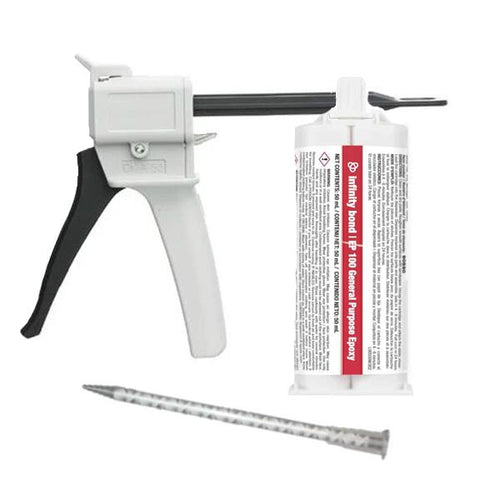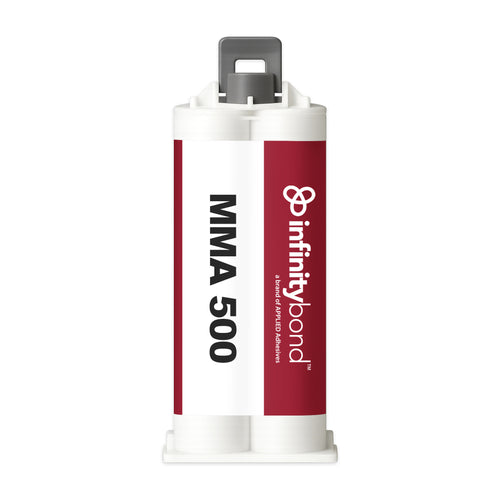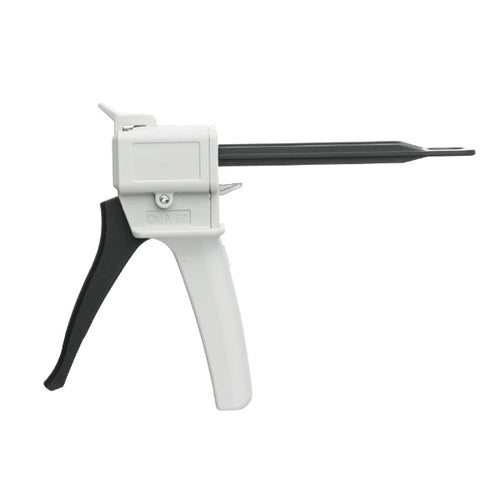Table of Contents:
- Why Epoxy Became the Standard Structural Adhesive
- Advantages of Epoxy Adhesives
- Disadvantages of Epoxy Adhesives
- When to Use Epoxy (and When Not To)
- Epoxy Alternatives
Epoxy adhesives are often the go-to recommendation for structural bonding because of their exceptional strength, but no adhesive is perfect. Every adhesive chemistry has its tradeoffs. While there are advantages to epoxy glues, there are also some limitations that can make them unsuitable for certain applications.
Understanding both the strengths and weaknesses of epoxy adhesives ensures you select the right bonding solution for your project. Our team breaks down the key pros and cons of epoxy glues to give you more guidance on when and when not to choose an epoxy for your application.
Why Epoxy Became the Standard Structural Adhesive
Epoxy adhesives are thermosetting polymers that cure through a chemical reaction between a resin and a hardener. This two-part system creates a rigid, high-strength bond that can handle substantial loads. Epoxies are also known for their great chemical resistance and weather resistance. This combination of properties has helped make epoxy the default choice for structural bonding in many industries.
Some common industries for applications of epoxy adhesives include:
-
Automotive
-
Aerospace
-
Marine
-
Construction
The Advantages of Epoxy Adhesives
Epoxy adhesives are high-performance adhesives that have many benefits when it comes to structural applications.
1. High Strength
Perhaps, the biggest benefit of epoxy adhesives lies in their great strength. Epoxies have a high shear and tensile strength that makes them ideal for handling static, rigid loads. They are generally considered to be the strongest of the structural adhesives and tend to perform well with metal-to-metal or composite-to-metal bonds.
2. Excellent Chemical Resistance
Another big advantage of epoxy glue is its high chemical resistance. Epoxy is resistant to many solvents, oils, acids, salt, grease, alcohol, and more. This high chemical resistance makes epoxy ideal for aerospace, marine, automotive, and laboratory applications where chemical exposure is common.
3. Good Heat Resistance
Compared to other types of structural adhesives, epoxy adhesives tend to have higher heat resistance. This heat resistance makes them great for structural bonding environments exposed to higher temperatures.
4. Dimensional Stability
A great pro of epoxy adhesives is their dimensional stability. Epoxies are designed for long-lasting performance even in harsh conditions with exposure to chemicals and high heat. They are often the adhesive of choice for permanent assemblies, composite structures, and joints where long-term reliability is critical.
The Disadvantages of Epoxy Adhesives
Despite their many advantages, epoxy adhesives also have some limitations that can detract from their appeal.
1. Poor Flexibility
While known for its great strength, a big epoxy adhesive limitation is its flexibility. Its high rigidity can make it brittle and put it at risk of cracking. It is typically not the best choice for dynamic conditions such as joints that are subject to regular vibration, impact, or shock.
2. Temperature and Moisture Limitations
While a benefit of epoxy glues is their heat resistance, they have their limits. Prolonged and continuous exposure to cyclic temperature changes or high humidity can cause the substrates to expand and contract. Over time, this movement can degrade the epoxy. In these extreme environments, other adhesives may be more suitable.
3. Surface Preparation
One disadvantage of epoxy glue is that it requires a fair bit of surface preparation to get a lasting bond. The substrates need to be clean, degreased, and abraded before application. On the other hand, some other structural adhesives are more forgiving of surface contaminants and require minimal surface preparation.
4. Long Cure Times
While there is a lot of variability from one product to another, epoxy adhesives generally have longer cure times. That being said, some epoxies have been specially formulated with faster cure times, and there is a lot of overlap between the different types of structural adhesives.
When to Use Epoxy (and When Not To)

Now that you are more familiar with the advantages and disadvantages of epoxy glues, you can understand why epoxy may not always be what you want to use. We break down when and when not to use epoxy adhesives.
Epoxy adhesives may be the best choice for applications where:
-
Maximum shear and tensile strength are top priorities
-
The joint is rigid, and the loads are primarily static
-
High chemical resistance is necessary
You may want to avoid using an epoxy adhesive in applications where:
-
Flexibility is a top priority
-
Joints are exposed to a high amount of vibration or impact
-
Thermal cycling regularly occurs, and there is continuous moisture exposure
-
Surfaces are difficult to clean and treat
What to Use Instead - Epoxy Alternatives
While epoxy adhesives are often a great choice for many structural bonding applications, there are other options when they aren't. These alternatives to epoxy adhesives could be exactly what you need.
|
Adhesive Type |
Properties |
Ideal Uses |
|
Limited surface preparation required, faster cure speeds |
Fast production speed or mixed substrates |
|
|
Good elongation, shock resistance, and flexibility |
High exposure to vibration, impact, and stress |
|
|
Good weather resistance, highly flexible |
High-temp or outdoor conditions |
Every application is unique, so it is important to take into consideration all the factors before choosing an adhesive. Strength, flexibility, cure time, substrates, and environmental conditions can all impact which type of adhesive will work best. Individual products also differ, so always check the technical datasheet for full product specifications.
Looking for More Than Strength?
There are many pros and cons of epoxy glues. While epoxy may generally be unmatched in strength, it is not always the best choice for every structural application.
We have a wide selection of epoxy adhesives glues, but if you need help choosing the right adhesive for your application, we are here. Contact us to speak with one of our adhesive experts and get a personalized product recommendation for your project.







